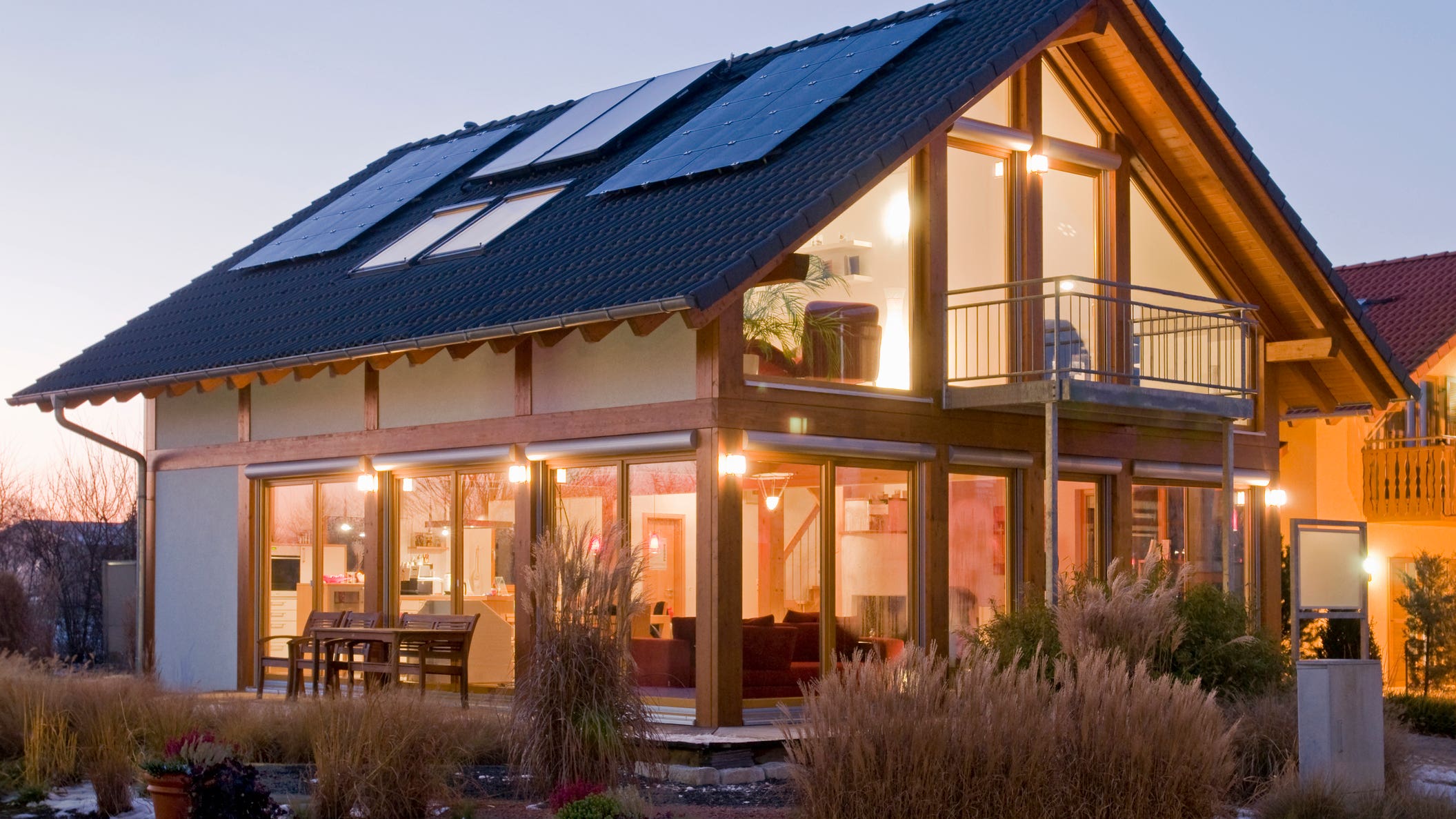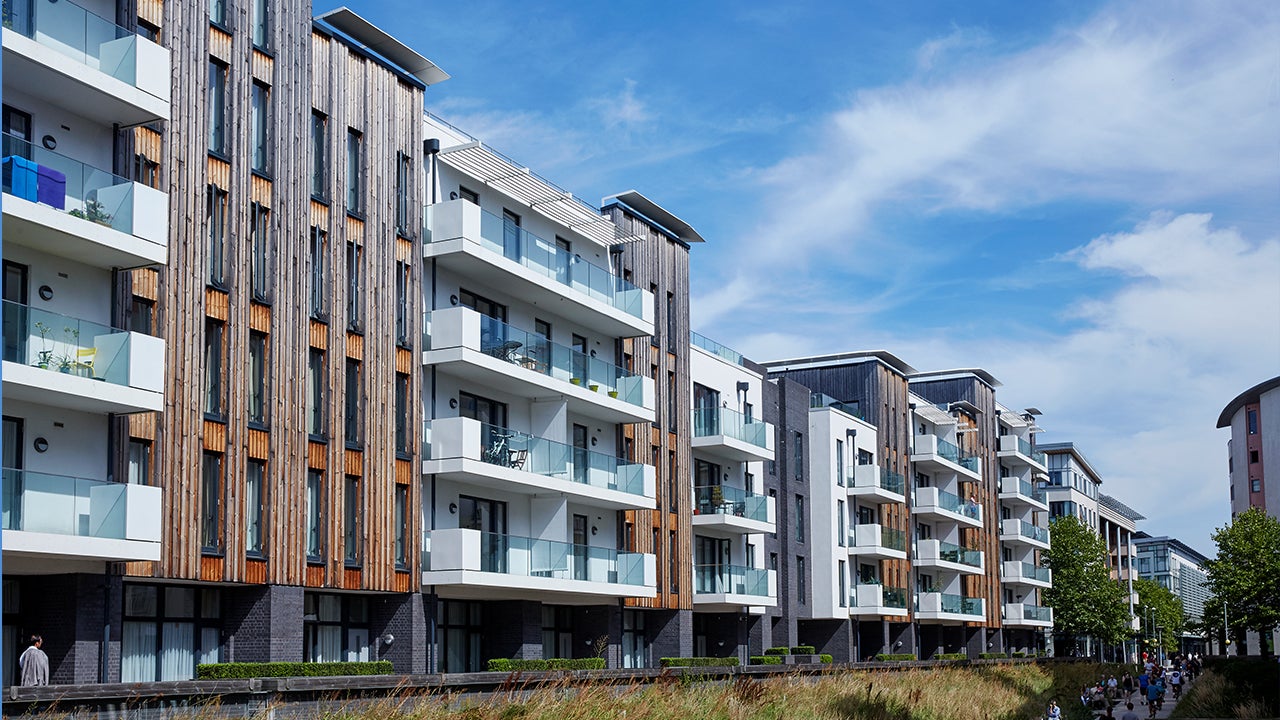What to know about buying a house with solar panels

If you’re looking for a new roof over your head, you might also be thinking about whether what’s actually on that roof can help the planet. According to the National Association of Realtors’ (NAR) “2022 REALTORS and Sustainability Report”, more than 50 percent of real estate professionals say their house-hunting clients are interested in sustainability. They’re finding plenty of options to match their needs, too: 77 percent of Realtors indicate that there are homes with solar panels available in their local markets.
Currently, solar energy produces over 4 percent of all electricity in the U.S., according to the Solar Energy Industries Association (SEIA). But that figure is going to increase with new legislation that just made it through Congress. According to estimates from the White House, approximately 7.5 million more households will be able to install solar panels on their roofs thanks to the tax incentives in the Inflation Reduction Act of 2022.
If you’re thinking about getting ahead of the curve and buying a house with solar panels, here’s what you need to know.
What are solar panels?
First, a quick primer: Solar panels (not to be confused with solar shingles or tiles) are devices that collect sunlight and convert it into energy, which can be used for electricity or stored in batteries for later use. As much of the world looks for renewable energy to help replace fossil fuel consumption, solar panels – also known as photovoltaic, or PV, systems – harness the natural, “clean” power of the sun in the sky and help negate the effects of driving gas-guzzling cars and relying on coal-fired power plants.
Interest in such environmental concerns is figuring more and more in residential real estate transactions. Half of agents and brokers in the NAR study indicate they helped a client buy or sell a property with green features during the past 12 months — a notable jump compared with 32 percent who did so in 2021. More specifically, the presence of solar panels on a property roof bumps up its perceived value, one-third of Realtors say.
6 questions to ask before buying a home with solar panels
When surveying a solar-paneled home, be sure to ask these key questions.
1. Who owns them?
While you might assume that buying a home means buying every piece of it, that’s not always the case with solar panels. In some cases, there is a lease arrangement where the owner of the home pays the company that owns the panels. Justin Baca, SEIA vice president of markets and research, says that around 25 percent of homes have third-party-owned solar panels, meaning the owner of the home pays a company a fee to use them.
“Homebuyers should ask whether the solar system is owned outright by the seller or whether they would have to take over a lease,” Baca says. “If there is a lease, they should check the terms to make sure they understand the costs and any options to buy out the lease. Either way, solar panels on the home are a great feature.”
2. Who installed the solar panels?
Make sure you ask whether a licensed professional installed the solar panels. There are plenty of self-installation kits available for DIY homeowners who aren’t afraid to get on their roofs. However, if the homeowner (or any non-professional) installs them, these panels may not qualify for protection under a warranty if the equipment fails.
3. What’s the condition of the roof?
With any home purchase, you want to know what sort of shape the roof is in. With a roof that has solar panels, the condition becomes an even more critical factor. If the roof is in bad shape, the panels have to be taken off before the roof can be repaired or replaced, and then reinstalled. This can add to the complexity, cost and length of any re-do. So, “the most important questions to ask are about the condition of the roof and panels themselves,” Waheed Akhtar, broker and owner of RE/MAX Dream Homes in Sacramento, California, says.
4. What will the maintenance needs be?
Like everything else in your home, solar panels may need to be cleaned or serviced from time to time to ensure they’re in the best condition possible.
“If you own the system in a place that gets a decent amount of rain, you likely won’t have to think about it for years,” Baca says. “I haven’t done a thing to my five-year-old system [in Syracuse, New York], and it’s performing as new.
However, “in places with more dust and less rain, cleaning based on local conditions isn’t a bad idea but should be done by an installer or other professional qualified to be on a roof safely,” he notes.
If you don’t own the panels outright, Baca points out that you won’t have to worry about the maintenance responsibilities. “If you have a lease, you likely have a performance guarantee, which will lower your lease payments unless the system performs to a certain level,” he says. “That makes maintenance the leasing company’s responsibility.”
5. What’s their average output versus the home’s average usage?
The main reason you’re buying a home with solar panels is to cover most – if not all – of your home’s energy needs. So, you’ll need to research the home’s average usage and compare it with the typical solar output. You can ask the seller for figures from the past year, and you can also use the National Renewable Energy Laboratory’s calculator to get a sense of how much energy you can expect to produce based on the location and the type of system.
After you understand how much of your own energy needs will be satisfied by the solar panels’ output, you’ll want to know if you have options with any surplus energy that you don’t use. Net metering, which involves selling the energy you don’t use back to other customers who need it, can provide additional financial benefits for you. This varies based on where the home is located (SEIA offers a map of states with net metering rules in place as a starting point). Be sure to ask your real estate agent for assistance in understanding if net metering is available for you.
6. What is the production guarantee?
In addition to knowing whether you can benefit if your system produces more than you need, it’s important to have an understanding of what happens if it produces less. Most companies offer production guarantees, which will reimburse you a designated amount if the system fails to deliver. For example, you might be guaranteed 12,000 kilowatt-hours in a year. If the system only produces 9,500 kilowatt hours, the company may need to issue you a check. Look at the contract to determine what, if any, guarantees are offered.
Getting a mortgage on a home with solar panels
Your mortgage application may have some additional complications if you’re buying a home with solar panels.
Mainly, your lender will be concerned if you can afford to cover lease payments for the system (if you won’t own them outright) in addition to all your other debts and financial responsibilities.
“Buyers interested in a home with solar panels have to make sure they qualify for and can afford the remaining payment on the panels,” Akhtar says. “This could be a lien or lease item, and that information has to be relayed to the lender to see if the prospective buyers qualify for the remaining payments. Sometimes contracts on the panels can be transferred over, and other times, new contracts have to be drafted. Every company is different, and the current price may not stay the same for a new buyer as things like personal credit rating are taken into consideration.”
Solar panel pros and cons
Homes with solar panels come with upsides and a few potential downsides. Consider some of these key points as you think about making an offer on a home with one.
Pros
You’ll save on your utility bills.
Baca says that homes with solar PV systems will typically have “much, much lower electric bills than comparable homes without solar.”
“PV systems are typically sized to provide 80 to 100 percent of the electricity the home has used historically,” Baca says. “Depending on local utility rates, the electricity bill for such homes could be 60 to 100 percent less than neighboring homes.”
Some homeowners insurance companies offer small “green home” discounts on premiums, which solar panels might qualify for, too.
You’ll be prepared for potential power outages.
Baca points out that homeowners with solar panels that allow energy to be stored can put themselves in more reassuring positions during extreme temperatures. “Electric distribution and transmission grids are aging and subject to increasing weather-related disruptions,” he says. “Solar with battery backup is the best strategy to keep your refrigerator and other critical home appliances running.”
You might get a tax break.
You could get reimbursed on your tax return when you become a solar-equipped homeowner. There are a range of state incentive programs that can lower the amount of money you will owe the government each year. However, it’s important to note that the tax credit currently making headlines from the Inflation Reduction Act — a 30 percent credit that runs through 2032, with smaller credits in 2033 and 2034 — applies only to homeowners who install a brand-new system. So, if you’re buying a house that already has solar panels in use, you’re out of luck on that one.
You’ll be happy when you’re ready to sell.
A recent study from Zillow showed that homes with solar panels sold for 4.1 percent more than similar properties without solar systems. Additionally, Baca points out that solar panels never go out of style, which means that they can yield consistent benefits for anyone living under the roof. “In contrast to most other home improvement projects, solar panels will last for decades and will always provide real savings on the cost of homeownership,” he says.
You’re doing your part to help the planet.
Solar panels will lower your carbon footprint. So, while you’re helping yourself, you’re also helping Mother Earth.
Cons
Repairing the roof can take even more time and money.
If the roof develops a leak or any other issue, you’re likely going to need to have a professional remove some or all of the solar panels to address the problem, adding to the repair’s complexity and cost.
You might have one more challenge in front of your closing.
There is a lot of paperwork involved in any kind of real estate transaction. If the solar panels on the home you want to buy are leased, it means you’re going to need to transfer the lease and deal with another company. While that’s not a huge issue, it does add one more step to the process and could potentially lead to a longer time to closing.
You don’t have any say over the sun.
You can’t control how many cloudy or rainy days will hang over your roof. While solar panels still work even when it’s overcast, their energy production capacity will be diminished, generating 10 to 25 percent of their normal power output. They also don’t work at night. To compensate, many folks install solar batteries as a backup energy source or use their net metering credits to finance conventional electricity.
The bottom line on buying a house with solar panels
Buying a home with solar panels can save you money on your utility bills while improving the environment. However, every solar panel system is different – with different output guarantees, leasing arrangements and other considerations. It can complicate your financing and your closing. Do your research to make sure you understand what’s on your roof — to ensure the panels provide a positive experience for your life and your bankbook, as well as for the planet.
Why we ask for feedback Your feedback helps us improve our content and services. It takes less than a minute to complete.
Your responses are anonymous and will only be used for improving our website.
You may also like

What is a condo? Pros and cons for homebuyers

How much does it cost to sell a house in Nevada?




